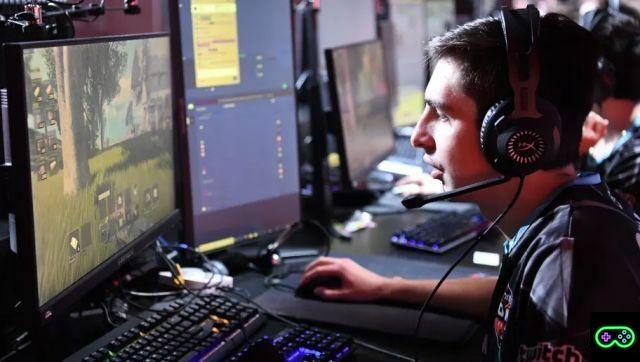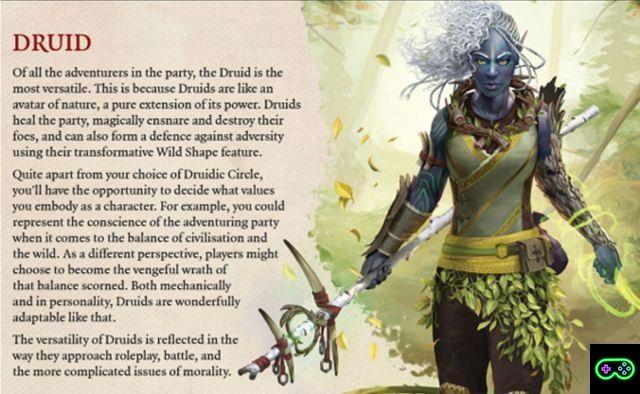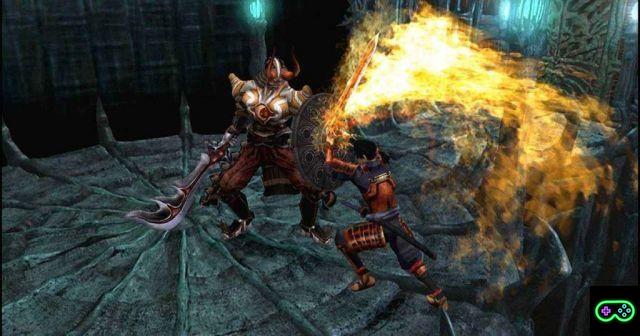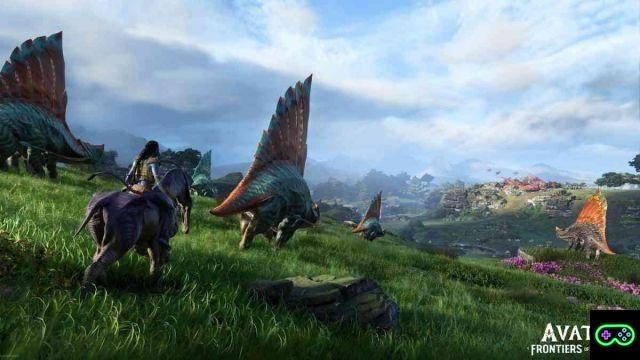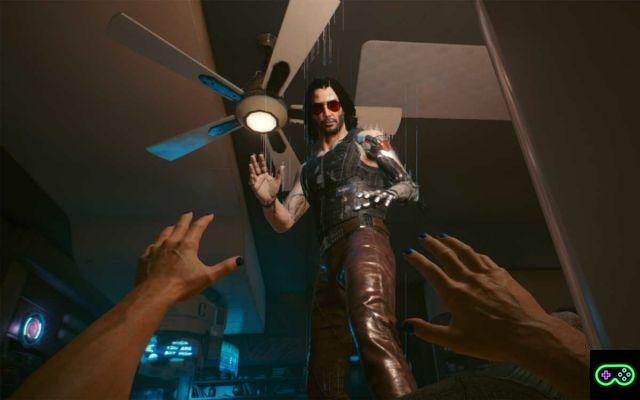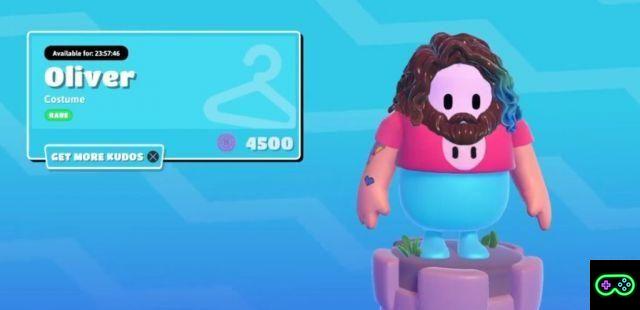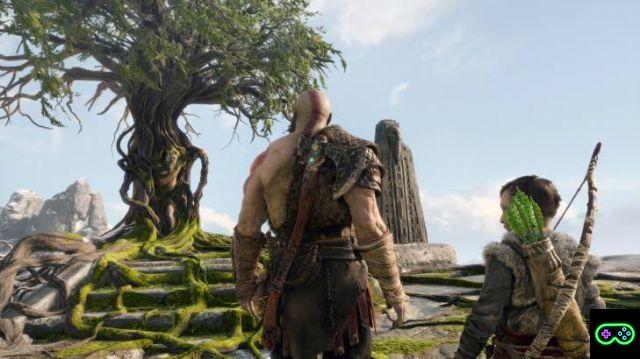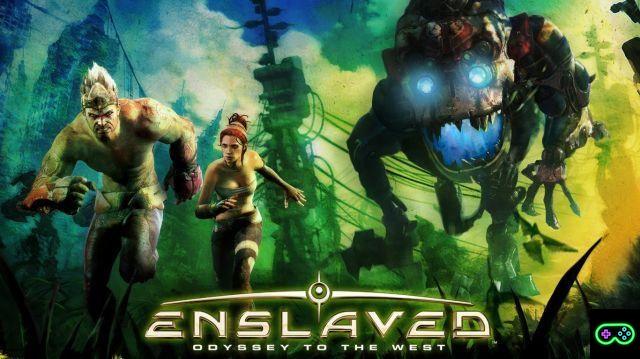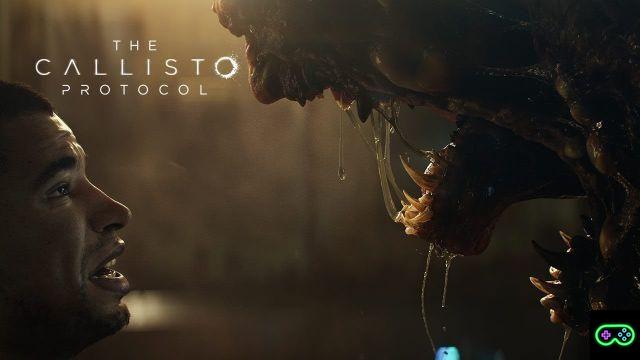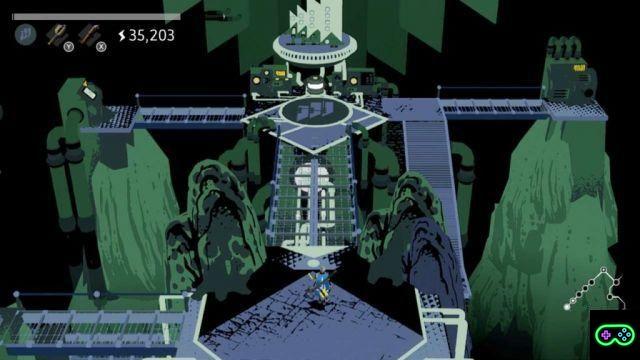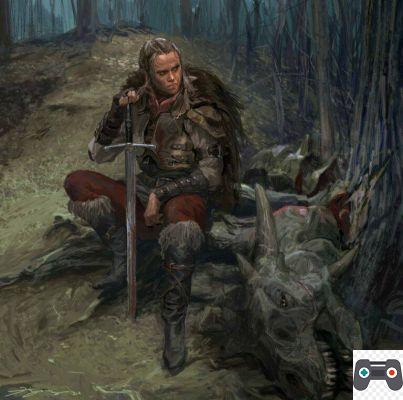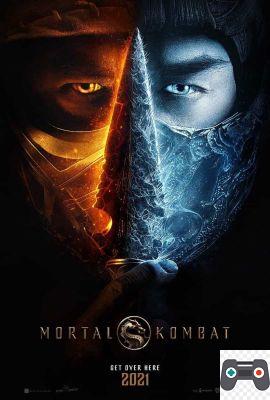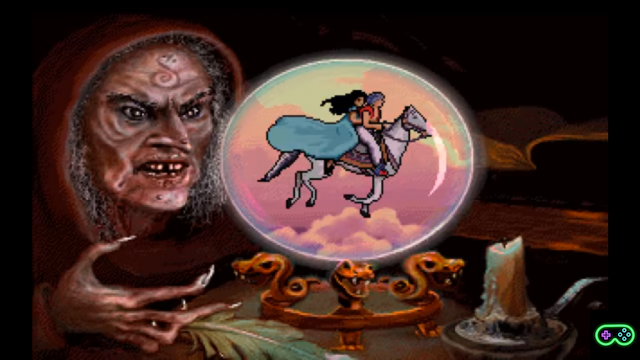Here we are at appointment number 23 with the Bear's Lair, the column entirely dedicated to mythology in video games. After an interminable excursus on Vampire: the Masquerade, let's go back to talking about videogames, and let's dive back into saga of God of War with a chapter released in 2007, for mobile only, and developed by Sony Online Entertainment e Javaground: I'm referring to God of War: Betrayal.
Although not considered canon in the strict sense, I have chosen to delve into the plot of this game equally hack-and-slash, two-dimensional and horizontal scrolling (side-scrolling), because the development team worked closely with the famous writer Marianne Krawczyk, screenwriter ofintera saga in God of War, which he used Betrayal to join the stories of God of War e God of War II, adding details to the plot and narrating the casus belli of the conflict between Kratos and Olympus gods.
![[The Bear's Lair] God of War: Betrayal and Greek mythology](/images/posts/17432d3b12ecfec44b0b855d20c7520f-0.jpg)
To begin exploring the themes dear to the investigators of the occult as we are, let's recap the milestones faced so far by the bald from Braz-Sparta, proceeding as always not in order of exit but ininternal chronological order to history, that is, from the point of view of Kratos:
- God of War: Ascension, published in 2013;
- God of War: Chains of Olympus, released in 2008;
- God of War, the first chapter, which dates back to 2005;
- God of War: Ghost of Sparta, released in 2010.
We have now arrived at the fifth chapter which - presumably, on the basis of the previous and subsequent titles - brings us to the fullest ofsiege of Rhodes.
The tragedy of God of War: Betrayal
The fifth step in the journey of Kratos he tells us about the events that took place afterwards Ghost of sparta and before God of War II.
We coupled Ares and took his place as gods of war, and we have also found (and lost almost immediately) our dear brother who is believed to have disappeared, Deimos. The Kratos they run a lot, because the Olympus gods essentially they refuse to free him from terrible visions of death that torment him, residue of the period spent in the service of the flamboyant Ares.
![[The Bear's Lair] God of War: Betrayal and Greek mythology](/images/posts/17432d3b12ecfec44b0b855d20c7520f-1.jpg)
Kratos decides to take a break from the titanic exploits, and starts playing Spartan: Total Warrior expand the influence of Sparta, using the broad portfolio of powers of the god of war. Obviously, the corollary of Murphy's Law takes place, which explains to us that the equivalent of the Blood War di Forgotten Realms come and knock on our door.
Hunting for Argos
In the middle ofsiege of Rhodes, Spartan warriors begin to fall like flies: they are mowed down by Argon, a legendary beast sent by Era, daughter of the primeval titans Cronus and Rhea, wife and sister of Zeus, mother of Ares, ruler of Olympus and equivalent of the Roman Juno.
The intent of Era is, of course, putting a spoke in the wheels of Chaos a Kratos, who has made up his mind to conquer a large part of the Mar Egeo, without regulation: the island of Rhodes, in fact, it is far from Sparta about six hundred kilometers as the crow flies.
![[The Bear's Lair] God of War: Betrayal and Greek mythology](/images/posts/17432d3b12ecfec44b0b855d20c7520f-2.jpg)
Long story short, Kratos rushes, invoked by his own men, and exterminates anyone who comes in front of him, including mythological creatures such as Minotaurs e Cerberus, until you meet the Giant Argos, i.e. the pet of Era. History almost seems to underline that, perhaps, Kratos he would have preferred a non-lethal approach, but during the fight Argon falls into the sewers of the city, and is skewered by a mysterious murderess.
![[The Bear's Lair] God of War: Betrayal and Greek mythology](/images/posts/17432d3b12ecfec44b0b855d20c7520f-3.jpg)
An extremely elusive killer, whose identity is as unknown as his face, and whose blades leave marks on the victims remarkably similar to those of Blades of Athena challenged by Kratos. In this way the blame for the killing of the beast of Hera it would fall on our hero.
![[The Bear's Lair] God of War: Betrayal and Greek mythology](/images/posts/17432d3b12ecfec44b0b855d20c7520f-4.jpg)
But when ever Kratos Did he need a hand to antagonize the gods?
The casus belli
The game explains that, so far, Zeus turned a blind eye to the killing spree of Kratos, just like it did too Athena, but the latter continues to taunt theOlympus with every transition screen and, you know, the patience of the gods has a limit.
Chasing themurderess, Our Kratos uses its blades and the Sword of Artemis to decimate the undead troops lined up by Ade, who reveals himself as a player on the Olympic chessboard. Perhaps Ade intends to discredit Kratos to avenge the death of his wife Persephone, pulped by the Spartan in Chains of Olympus?
![[The Bear's Lair] God of War: Betrayal and Greek mythology](/images/posts/17432d3b12ecfec44b0b855d20c7520f-5.jpg)
At any rate Kratos he makes his way through enemies, exterminating and devastating, and gathering artifacts like the Eyes of the Gorgon and Feathers of the Phoenix, and using their powers including theArmy of Hades and Gaze of Medusa. These skills, along with the weapons we wave around, are obviously references to previous chapters of the saga.
![[The Bear's Lair] God of War: Betrayal and Greek mythology](/images/posts/17432d3b12ecfec44b0b855d20c7520f-6.jpg)
The devastation, however, exceeds all limits: Zeus send his nephew, Ceryx, to order a Kratos to put an end to hostile actions against theOlympus, as well as his conquest of the Greek city-states.
Kratos he is not there, and faces the Olympic messenger, which he is not Hermes -which would hold the title-, but his son. Me too'Olympus knows the plague of nepotism, in conclusion.
![[The Bear's Lair] God of War: Betrayal and Greek mythology](/images/posts/17432d3b12ecfec44b0b855d20c7520f-7.jpg)
While themurderess flees, making fun of the Spartan, the alopecic hero attacks Ceryx who, not being a warrior, after a while succumbs to the fury of Kratos. The last words of Ceryx they are extremely loaded with meaning, and refer to both the past, the present and the future of the Spartan: "Kratos, slayer of the gods ».
The aftermath of Kratos' fury
While the Spartan celebrates with his men, to celebrate victory and the future conquest of Rhodes, on the other Zeus takes note of the new challenge god of war: the corpse of Ceryx it is an excellent argument in favor of the need for action.
Although themurderess failed to discredit Kratos, framing him for the death of the Giant Argos, our hero does it very well on his own, yielding to his own berserk fury and knocking down the messenger who, at the same time, is son of Hermes e nephew of Zeus.
![[The Bear's Lair] God of War: Betrayal and Greek mythology](/images/posts/17432d3b12ecfec44b0b855d20c7520f-8.jpg)
Kratos he surely realizes that this act constitutes treason, and that there will be serious consequences upon his return to theOlympus; but the Spartan doesn't give a damn, since, in reality, he has never abandoned his intentions of revenge against Olympic gods playing with the life and death of human beings.
Il god of war, more and more stained by divine blood and still tormented by visions of the killing of his own family by his hand, he returns to his plans of conquest, and prepares for the now inevitable war against the Olympus gods.
Greek mythology in God of War: Betrayal
Now that we've summed up the plot and seen the main characters and facts, we can dive into Greek myth which is the basis of this game.
In addition to Argon, Ceryx, the cerberi, the minotaurs and the legions of undead sent by Ade, the legendary themes and mythological creatures that we encounter in this chapter of the saga also include Era, Zeus, Hermes, Medusa, Gorgons, Persephone and Eleusinian Mysteries.
![[The Bear's Lair] God of War: Betrayal and Greek mythology](/images/posts/17432d3b12ecfec44b0b855d20c7520f-9.jpg)
Let's get to work, then, and let's start from ...
Argo, the all-seeing one
In the game Argon it is a gigantic beast, covered with eyes. Also in the Greek myth the figure of Argo Panoptes (“That all sees“) is linked to the eyes: according to some sources has only one eye, in other stories it has two in front and two in the back the head, according to others still has it one hundred, the half of which remains wide open even during sleep, and in other sources of the myth Argon ha infinite eyes, which cover his entire body. Just like theArgon of the game, in short.
![[The Bear's Lair] God of War: Betrayal and Greek mythology](/images/posts/17432d3b12ecfec44b0b855d20c7520f-10.jpg)
Unlike this, however, theArgon of Greek myth is not a monster created by Era, but it is a humanoid giant, famous for killing echidna and for having been involved - in spite of himself - in the umpteenth escapade of Zeus. The Father of the Godsin fact, he had fallen in love with the nymph Io; to hide it from the fierce jealousy of Era, however, he had turned her into… a cow.
La Queen of Olympus, however, he knew well themarital infidelity di Zeus, and therefore asked for that heifer as a gift; the Father of the Gods he was forced to consent, in order not to reveal his affair, and Era put to guard the cow / Io just Argo Panoptes, to avoid Zeus devised a left-handed shot to get away with it.
![[The Bear's Lair] God of War: Betrayal and Greek mythology](/images/posts/17432d3b12ecfec44b0b855d20c7520f-11.jpg)
Let it not be said, however, that the Father of the Gods was not always ready to cover up his misdeeds: he concocted a plan with Hermes, to recover Io and avoid the fury of Era.
The death of Argos, the Bosphorus and Astarte
Using his own sleepy music, Hermes made him fall asleep Argon telling him the story of Pan and Syringe, then hit him repeatedly with a stone and finally, for good measure, cut off his head as well. Hermes he was a professional, on the other hand. The nymph Io, thus, she was released, but the wrath of Era it had no limits.
![[The Bear's Lair] God of War: Betrayal and Greek mythology](/images/posts/17432d3b12ecfec44b0b855d20c7520f-12.jpg)
La Queen of the Gods he sent a gadfly to torment the heifer, which was forced to run wildly to try to escape the annoying insect bites. Running running, he came up to the strait that connects Europe and Asia, crossed it while giving it the name of Bosphorus (literally “passage of the heifer“), it reached as far as Egypt and there she gave birth Epaphras, finally regaining the human aspect.
A curiosity: this Epaphras he was kidnapped by some priests of Hera, but they were discovered and electrocuted by Zeus, before they could reveal where they had hidden the infant; the poor Io he set out in search of his son and found him in Syria, breast of Astarte. Yes, just theAstarte – Great Mother we talked about during the discussions on Vampire: the Masquerade and Darksiders 2, and which probably influenced the figure of Afrodite.
![[The Bear's Lair] God of War: Betrayal and Greek mythology](/images/posts/17432d3b12ecfec44b0b855d20c7520f-13.jpg)
Back in Egypt, Io married the Re Telegono, And then Epaphras inherited theEgypt; afterwards Epaphras married a daughter of god NileCalled menfi, and in his honor he founded the city of the same name, before giving life to a lineage from which, over time, the Libyan, Pygmy and Ethiopian peoples descended.
The birth of the peacock
Era, however, he had not finished yet: he took the countless eyes from the poor man's body Argon, except two, and transferred them to the feathers of the animal most sacred to her: Peacock.
![[The Bear's Lair] God of War: Betrayal and Greek mythology](/images/posts/17432d3b12ecfec44b0b855d20c7520f-14.jpg)
Together with the eyes of Argos, in the game we also find legendary feathers: not those of the peacock but those of the phoenix. We have already met them in God of War: Chains of Olympusin God of War (2005) and now we meet them again in Betrayal; we will see them again in the next chapters area of saga in Kratos, always with the function of magic catalyst.
![[The Bear's Lair] God of War: Betrayal and Greek mythology](/images/posts/17432d3b12ecfec44b0b855d20c7520f-15.jpg)
Medusa and the Gorgons
If these phoenix feathers enhance the arcane power di Kratos, in the saga we also find the Eyes of the Gorgon, which increase thelife energy of the Spartan. Furthermore, during the game, we have the opportunity to use it regularly petrifying gaze of Medusa, also present in God of War (2005).
![[The Bear's Lair] God of War: Betrayal and Greek mythology](/images/posts/17432d3b12ecfec44b0b855d20c7520f-16.jpg)
We have already spoken several times about Medusa and Gorgons, both when we analyzed the relationships between God of War and Greek mythology, both when we talked about the arrival on Netflix area of TV series Kaos, completely focused on Greek and Roman myths.
Summing up, Medusa is part of a trio of sisters, the Gorgons, grandchildren of Primordial Titan Gea / Gaia. In Greek myth we see that the Greek hero Perseus uses a shield, well polished to a mirror, to counteract its petrifying power.
![[The Bear's Lair] God of War: Betrayal and Greek mythology](/images/posts/17432d3b12ecfec44b0b855d20c7520f-17.jpg)
The hero in short beheads her and gives her head, crowned with snakes, to the of Athens who, according to the different literary sources, will make an armor of it or will install it on his own shield: theaegis. And where he was born Perseus? In the Greek city-state of ... Argon, which bears the same name as Argo Panoptes!
[Illuminati intensifies.]
Always speaking of Argon, I announce that we will see it once again in the saga in Kratos. Or better, Kratos he would run into him again in the course of God of War III, if it hadn't been decided to cut it. Below I leave you the model of this character designed for GoW3.
![[The Bear's Lair] God of War: Betrayal and Greek mythology](/images/posts/17432d3b12ecfec44b0b855d20c7520f-18.jpg)
Cerberus and minotaurs
We have already dealt with the broad discourse on the Minotauro, on the myth of Theseus and Ariadne and on Maze of Daedalus.
On the other hand in the Pandora's Temple we have already dealt with, perhaps, the Minotauro original, while the minotaurs of God of War: Betrayal they are closer to the aspect of the myth: tall, big, muscular, half man and half bull, and with a big ax in tow.
![[The Bear's Lair] God of War: Betrayal and Greek mythology](/images/posts/17432d3b12ecfec44b0b855d20c7520f-19.jpg)
These minotaurs also appear in a decidedly labyrinthine area of the game, so bonus points to the developers for putting them there (or from then on).
After the prequel Ascension it is the first God of War of 2005, also in Betrayal we find the dear, old ones tricefali cerberi. In this chapter Kratos cut off two of the canine heads and impale the central one, so I'd say the Spartan gets along very well with these.
![[The Bear's Lair] God of War: Betrayal and Greek mythology](/images/posts/17432d3b12ecfec44b0b855d20c7520f-20.jpg)
I wonder if Kratos will also come out unscathed from the clash with the father of these mini-cerberi, that is the Cerberus original that we will only encounter in God of War III.
Cerice or Ceryx
Speaking of cerberi: in the game they are often summoned by the final boss, Ceryx, son of Hermes and therefore grandson of Zeus. In Greek myth this figure corresponds to Ceric, equally son of Hermes according to some sources, whose name basically means herald.
![[The Bear's Lair] God of War: Betrayal and Greek mythology](/images/posts/17432d3b12ecfec44b0b855d20c7520f-21.jpg)
If in Betrayal we see that Ceryx is sent as messenger of the gods of Olympus, in mythology Ceric was a priest of the city of Eleusis; this figure not only founded two priestly lineages linked to cult of Demeter, that is i Kerykes and Eumolpidae actually existed in Greece in the fourth century BC, but also gave birth to the famous Eleusinian Mysteries.
The Eleusinian Mysteries
Here there would be a lot to write, but there are much more authoritative sources to draw on to quench one's thirst for ancient knowledge.
It is enough for us to remember that i Eleusinian Mysteries they almost certainly predate the cult of the Olympus gods, consisted of secrets - but very famous - mystery religious rites, celebrated annually in Sanctuary of Demeter, located in the Greek city of Eleusis, in which according to the myth he officiated Cerice / Ceryx.
![[The Bear's Lair] God of War: Betrayal and Greek mythology](/images/posts/17432d3b12ecfec44b0b855d20c7520f-22.jpg)
these Eleusinian Mysteries revolve around the figures of the goddess Demeter and his daughter Persephone, and the kidnapping of the latter by Ade; the Mysteries were also characterized by a cycle rigorously composed of three phases:
- la perdita of his daughter Persephone, and the descent into Hades;
- out of breath search of the mother Demetra;
- therise towards the world of the living and the reunion of mother and daughter.
This cycle also represents the changing of the seasons: when Persephone it is with the mother we have Spring and Summer, while when it comes back from Ade negli infer Autumn and Winter arrive.
in Mysteriesfinally, there are many elements that can be connected with the previous ones Minoan cults, with those Persians and Syrians, and even with the Egyptian myth di Isis and Osiris: the same Herodotus associates Isis a Demeter, and compares the search for Osiris by the first to the search for Persephone by the second.
![[The Bear's Lair] God of War: Betrayal and Greek mythology](/images/posts/17432d3b12ecfec44b0b855d20c7520f-23.jpg)
The Eleusinian Rites
I Eleusinian Mysteries they were celebrated with gods mystery and initiation rites, to which all non-barbarians were admitted, that is, anyone who did not charge in Ira who spoke Greek, who also substantially had a fairly clean criminal record.
I Rites they were divided into two parts:
- i little mysteries, that is, a purification rite held in Spring;
- i great mysteries, an initiatory consecration celebrated in Autumn.
This rebirth of Persephone in Spring it represents, for the initiates of the mystery cult, the eternity of life and the flow of this from one generation to the next.
These rituals included visions of one life after death, and for this reason several scholars link to Rites of Eleusis consumption of horned rye bread: simple rye, but contaminated by Claviceps purpurea, a mushroom from the elevated hallucinogenic power.
THEhorned rye poisoning, which in addition to hallucinations also causes convulsions and sometimes gangrene, in the centuries that make up the Middle Ages it was known by the name of St. Anthony's fire; the hallucinations caused by this pathology could be the basis of the legend of witchcraft.
Il bas-relief of Pharsalusalso depicts Demeter and Persephone who exchange what, in fact, might seem like gods hallucinogenic mushrooms of the genus psilocybe.
![[The Bear's Lair] God of War: Betrayal and Greek mythology](/images/posts/17432d3b12ecfec44b0b855d20c7520f-24.jpg)
I do not know of widely accepted studies in this sense, so we will limit ourselves to remembering that, having become a famous festival during theHellenism, and Riti ei Eleusinian Mysteries they also spread to Rome, to the point that they even participated - among others - Cicerone, Adriano e Marco Aurelio.
![[The Bear's Lair] God of War: Betrayal and Greek mythology](/images/posts/17432d3b12ecfec44b0b855d20c7520f-25.jpg)
Even today we can find, in that part of the Southern Italy which constitutes the Magna Grecia, many testimonies of these rites and of cult of Demeter and Persephone.
Hades and Persephone
To conclude, let's move on to Hades question.
On one side Ade helped Kratos in God of War (2005), giving it the ability Army of Hades which we also see in God of War: Betrayal; on the other the god of the Underworld he has a very valid reason to be mad at the Spartan.
![[The Bear's Lair] God of War: Betrayal and Greek mythology](/images/posts/17432d3b12ecfec44b0b855d20c7520f-26.jpg)
As we have already said, perhaps it is precisely because of the death of Persephone at the hands of Kratos and Ade has decided to change its attitude towards the god of war, and to plot in the shadows to discredit and overthrow the Spartan?
We have already discussed extensively the complicated relationship between Hades and Persephone, and we also told the events (and death) when we analyzed the Greek myths in God of War: Chains of Olympus, so there's no need to go back to it again.
What intrigues me is, instead, the role of Hades in what, with each chapter of the saga, appears more and more as one conspiracy against Kratos. In the course of the game Ade send troops of the underworld and hellhounds against Kratos, to slow it down as it chases themurderess. But why? Maybe theAssassin of Argos was sent by Ade?
![[The Bear's Lair] God of War: Betrayal and Greek mythology](/images/posts/17432d3b12ecfec44b0b855d20c7520f-27.jpg)
But in the Greek myth, as we have already mentioned, Argo is killed by Hermes. And in fact, according to some fan speculations, theBetrayal assassin it would be Hermes which, in agreement with Ade, killed Argon with weapons similar to those of Kratos, so as to put the blame on the Spartan and frame him in front of the others Olympus gods.
![[The Bear's Lair] God of War: Betrayal and Greek mythology](/images/posts/17432d3b12ecfec44b0b855d20c7520f-28.jpg)
As we will also see in the next chapters of the saga, now Hermes is furious with Kratos because, precisely in the course of this plan of Ade and -perhaps- of Hermes (and maybe other Olympic gods too?), the god of war has extinguished the life of Ceryx, son of the same Hermes!
In short, the saga will continue with God of War II, and we will see some really good ones.
As always, at this point all that remains is to give us an appointment at Wednesday next.

![[The Bear's Lair] God of War: Betrayal and Greek mythology](/images/logo.png)


